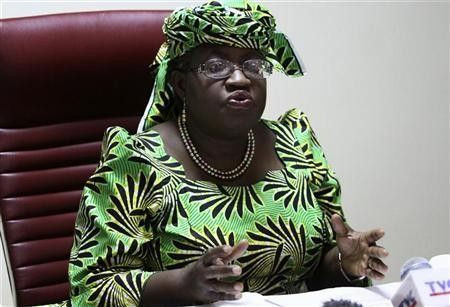Nigeria eyes 2012 budget deficit under 3 pct: finmin

Nigeria's 2012 budget will be based on average oil production of 2.48 million barrels per day and a benchmark price of $75 dollars per barrel, the country's finance minister said on Friday.
Ngozi Okonjo-Iweala, who doubles as coordinator of the economy, also said Nigeria would keep its budget deficit to GDP to within 3 percent next year.
The benchmark for the 2012 budget will be $75 (a barrel) with production of 2.48 million bpd. We want to stay within 3 percent fiscal deficit and trending downwards in the next 4 years, Okonjo-Iweala said following a special budget cabinet meeting in the capital.
The former World Bank chief was sworn into her role last month and has pledged to trim government spending, boost job creation and finish failing infrastructure projects.
The announcement of the oil price and production assumptions have come much earlier in the year than usual, a sign that Okonjo-Iweala is following up on her plans to overhaul the way the budget is formed in Africa's most populous nation.
Government offices often spend months without knowing how much money they have for the year because political wrangling causes delays to finalising spending plans. President Goodluck Jonathan only signed the 2011 budget into law at the end of May.
Okonjo-Iweala has said the 2012 budget will be ready for the national assembly next month or in November but that could be where the most difficult challenge begins.
Lawmakers have been criticised by senior government officials in the past for their large salaries and high expense claims, in a country where most people live on less than $2 a day.
If Okonjo-Iweala keeps her promise to slash recurrent expenditure then the budget could face strong opposition from lawmakers, which would cause delays.
Brent crude oil was trading at over $113 a barrel on Friday. Nigeria saves revenues above the benchmark prices set in the budget into an Excess Crude Account (ECA) to protect the economy from price crashes.
But the account has been drained in recent years and Jonathan recently signed into law a bill to start a Sovereign Wealth Fund as a better and more transparent way of managing its oil savings.
The ECA contained more than $20 billion when late President Umaru Yar'Adua came to power in 2007 but by the end of last year it held less than $1 billion.
© Copyright Thomson Reuters {{Year}}. All rights reserved.





















